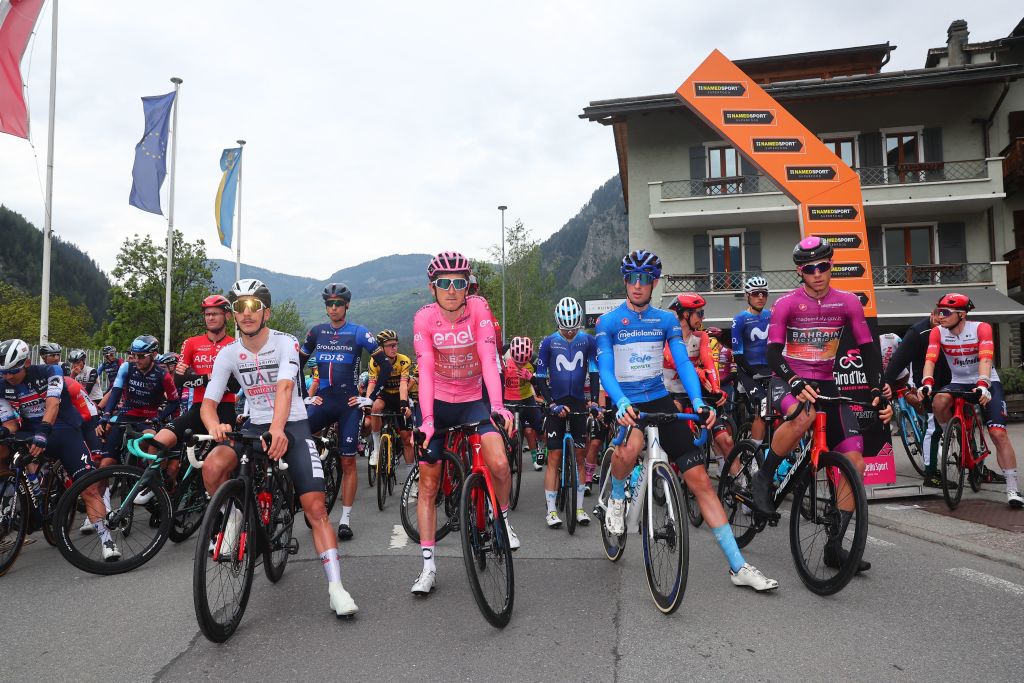
Stage 13 of the Giro d’Italia was shortened to just 74.6km, with a stalemate and stand-off between the GC contenders producing no change in the battle for the maglia rosa on what should have been one of the decisive stages of this year’s race.
Yet the stage could be remembered as the day of historic compromise between the riders, teams and race organisers RCS Sport.
The decision to cut the Col du Grand Saint-Bernard from the stage, travel 130km by bus into Switzerland, and just race over the Croix de Coeur climb and up to Crans Montana angered many, especially the roadside fans in Italy, but may prove to be the turning point of the race.
Race leader Geraint Thomas confirmed that if RCS Sport and the UCI officials had not agreed to cut the stage, the riders could have gone on strike. That would have sparked a huge deterioration in the rider-Giro d’Italia relationship and led to the polemics and protests overshadowing the racing.
One well-informed source suggested to Cyclingnews that if relations had spiralled out of control, the Giro d’Italia could have even struggled to reach the finish in Rome. A historic compromise kept the Corsa Rosa on the road.
“At the end of the day, it’s us, the riders, who go out there and put our bodies on the line, race down dodgy descents in the cold and wet and get sick,’ Thomas argued, confirming a strike was possible.
“If the organisers hadn’t listened, it might have gone that way (a strike), but fortunately, there was a good discussion, and both sides compromised. That’s what worked well. Both sides were happy at the end of the day.”
Many on social media and in Italy, including former Giro d’Italia winner Stefano Garzelli, who works for RAI television, came out against the decision and so against the riders, who voted with 19 teams in favour and three against.
Pier Augusti Stagi, the influential editor of Tuttobiciweb said that the riders had called wolf, that the weather was not too bad and that the Giro d’Italia organisers had made a mistake by giving in to the riders.
With the riders having faced almost daily rain so far in the Giro d’Italia, and more mountain stages and perhaps testing conditions to come, veteran Giro d’Italia race director Mauro Vegni could only bite his lip, compromise and agree to the change.
“I have to say it’s never easy to find an agreement because everyone has their own interests. My interest is the Giro,” he said.
The power of a union
The Giro d’Italia has endured strikes, protests and chaos in the rain and snow in recent years. There are suggestions that the riders were close to going on strike on stage 10 to Viareggio due to the cold rain. Vegni wanted to avoid that and keep the Giro d’Italia on the road. Enough drama has already happened since the start two weeks ago, with COVID-19, crashes and illness reducing the peloton to just 135 riders.
A more organised approach was put in place to resolve the stage 13 weather concerns. The riders were told to vote and decide their position the night before to avoid any confusion on the morning of the stage. They voted to race up the Col du Grand Bernard but then avoid the Croix de Coeur and its testing descent.
However, on Friday morning, the teams then apparently suggested a different solution and a compromise, with the idea to do the Col du Grand Bernard by bus and then race from the end of the tunnel. Vegni insisted on starting in the valley and racing the Croix de Coeur, and the CPA and the riders agreed to that compromise.
Thomas believes in the role and the power of a union and accepted the process established by the Cyclistes Professionnels Associés (CPA) riders association and agreed by the UCI, teams and race organisers via the Extreme Weather Protocol.
“We had the vote with the information we had last night, and the outcome was that 88% of the riders and teams voted to go this way. After that, we had to stick together, that’s what makes a union a union,” Thomas said, not afraid to speak out for his fellow riders as the current race leader.
“That might sound harsh, but we’ve got to do what’s best (for us). In hindsight, the weather wasn’t as bad as expected the night before, but that was all we had to go off to decide. The main thing is to have a plan B, and so avoid any chaos.
“At the end of the day, I think it was still a good race. It probably made it more intense, and we went quicker. The future has shorter stages anyway, and so the whole debate is six and two threes.”
The new CPA president is not at the Giro d’Italia, but Cyclnignews understands he was closely involved in the rider vote and compromise. He explained his position on social media.
“If anyone disagrees with their choice, I will wear the cost. So send your criticism at me, not the riders. The riders are the heroes of this sport, and I believe they should focus solely on their racing rather than being subjected to negative remarks,” he wrote.
“The extreme weather conditions experienced this year are beyond anyone's control, and the riders are grateful for the support of the RCS, volunteers, and fans. They will do their best to put on a show for the world to watch!”







